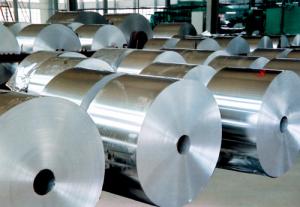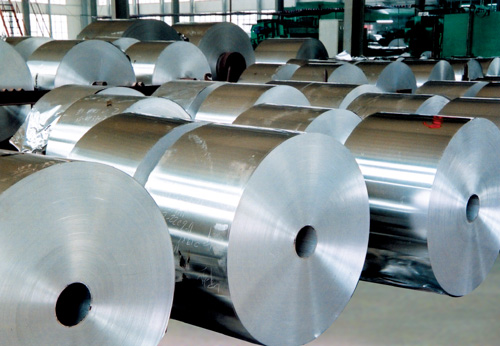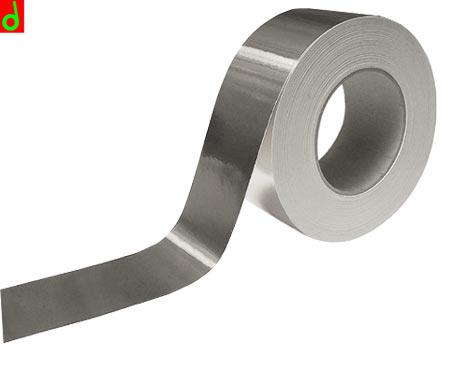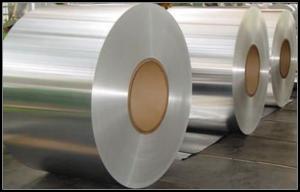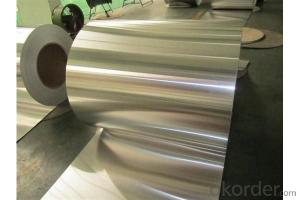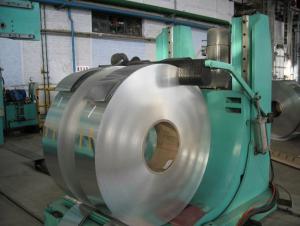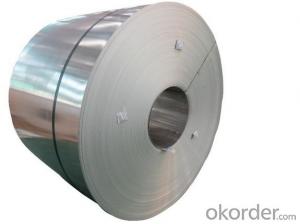Mastic Aluminum Coil for Foil Stock Sale
- Loading Port:
- China Main Port
- Payment Terms:
- TT OR LC
- Min Order Qty:
- -
- Supply Capability:
- -
OKorder Service Pledge
Quality Product, Order Online Tracking, Timely Delivery
OKorder Financial Service
Credit Rating, Credit Services, Credit Purchasing
You Might Also Like
Alloy: AA 8011
Temper:H14/16/18/22/24/32,HO etc.
Thickness:0.2mm—0.4mm
Width:200mm—2000mm (Can be slitted)
InnerDiameter: 508MM
CoilWeight:100kg
Application: Foil stock
- Q: Are aluminum coils easy to bend and shape?
- Yes, aluminum coils are relatively easy to bend and shape. Aluminum is a malleable metal, which means it can be easily deformed under compression without breaking. This property makes it highly suitable for shaping and forming into various shapes and sizes. Additionally, aluminum coils can be manipulated using different techniques such as rolling, bending, or pressing, allowing for a wide range of applications in industries such as construction, automotive, and manufacturing. However, the ease of bending and shaping aluminum coils may also depend on the specific alloy and thickness of the coil. Thicker coils may require more force and specialized equipment for shaping, while certain alloys may have different levels of malleability. Overall, aluminum coils offer a versatile and relatively easy-to-work-with material for bending and shaping purposes.
- Q: What is the electrical conductivity of aluminum coils?
- Aluminum coils have a relatively high electrical conductivity. Renowned for its impressive conductivity, aluminum boasts a rating of approximately 37.7 x 10^6 siemens per meter (S/m). As a result, aluminum is an exceptional option for a range of electrical uses, particularly in coil production. The exceptional conductivity of aluminum facilitates the efficient transmission of electric current through the coils, rendering them a fitting choice for electrical wiring, transformers, motors, and other electrical apparatus.
- Q: What is a better deal?Aluminum Cookware ( Paula Deen)orHard Anodized ( Rachael Ray )
- The okorder /
- Q: Can you create a tank, AFV, IFV etc. from aluminium or is this just a stupid idea that would kill everyone inside?
- Armored Personnel carriers are made of Aluminium and pretty hard. I saw an APC, the old M113A2, take a 7.62 round (by accident) at point blanck range and it just nicked it up a bit. it wouldn't take a shaped charge or a Sabot round though. Aluminum does have one advantage of steel with respect to Sabot rounds, if the hatches are open on an APC, the Sabot round will just go in and out without causing a whole lot of damage, unless of course it struck a combustable or the engine, or a crewman. The old M551 was made of Aluminum and styrofoam, it could float nicely and could be dropped by parachute. It was a cool little tank, unfortunately, it only held 14 maingun rounds. It was a tiny tank with a huge gun. Also too, you could create a tank out of aluminum, and then use bolt on or applique steel armor and also you could bolt on Explosive Reactive Armor, to stop the effects of a shaped charge type round. The design of a tank is important too. If you plan on a defensive strategy, you want a tall tank that is slope a lot in front so it can easily hide behind cover and burms and only show a small portion to the enemy and so, use the earth as armor. If your over all strategy is offensive, you want a squat tank that is small and difficult to hit at long range. The old M60 tank and the T-55 are good examples of a defensive tank and an offensive design.
- Q: What are the elements and compounds that make up an aluminum coil?
- <p>The chemical composition of an aluminum coil is primarily aluminum (Al), which is a lightweight, malleable, and ductile metal. It is usually represented by its elemental symbol 'Al' and has an atomic number of 13. Aluminum is often alloyed with other elements to improve its strength and performance. Common alloying elements include copper (Cu), magnesium (Mg), manganese (Mn), silicon (Si), and zinc (Zn). These elements are added in varying percentages depending on the specific properties required for the aluminum coil's application. The purity of aluminum in a coil can range from 99.00% to 99.7%, with the remainder being trace amounts of other elements.</p>
- Q: Dongying power plant with 0.6mm thick insulation aluminum coil, manufacturers can be divided into small volumes?
- How wide is the inside diameter of an aluminum roll; a roll of multiple. Small volume of MOQ is required.
- Q: What are the different types of alloys used for aluminum coils?
- Aluminum coils are commonly made using several different types of alloys. The most frequently used alloy for aluminum coils is 3003, which is known for its excellent corrosion resistance and moderate strength. It finds its application in roofing and siding where high strength is not a requirement. 5052 is another alloy that is commonly used for aluminum coils. This alloy possesses good weldability and formability, making it suitable for a wide range of uses. In the automotive industry, it is often employed for body panels and fuel tanks. 6061 is a popular choice for aluminum coils due to its outstanding strength. It is frequently used in structural applications, such as aircraft parts in the aerospace industry and structural components in the construction industry. Additionally, other alloys like 1100, 5005, and 8011 are also used for aluminum coils. Each of these alloys has distinct properties and characteristics that make them suitable for different applications. For instance, 1100 is known for its high electrical conductivity and is commonly used in electrical applications. On the other hand, 8011 is frequently utilized for packaging and food containers due to its excellent corrosion resistance. In conclusion, the various alloys used for aluminum coils include 3003, 5052, 6061, 1100, 5005, and 8011. These alloys possess different properties and characteristics, making them suitable for a wide range of applications across industries like automotive, aerospace, construction, and packaging.
- Q: Is it safe and effective to use aluminum coil for baking purposes?
- <p>Yes, aluminum coil can be used for baking. It is a common material in baking due to its excellent heat conductivity, which allows for even heating and browning of baked goods. However, it's important to ensure that the aluminum coil is food-grade and clean to avoid any contamination. Additionally, some people may be concerned about potential health risks associated with aluminum, although these concerns are generally considered minimal when using aluminum cookware for baking.</p>
- Q: Can aluminum coils be used for automotive body panels?
- Yes, aluminum coils can be used for automotive body panels. In fact, aluminum is a popular choice for car manufacturers due to its lightweight and corrosion-resistant properties, leading to improved fuel efficiency and longevity of the vehicle.
- Q: Aluminum is soft, so I have a roll coating, the material is very soft, 0.7*970, into 2100, it can be processed
- The profile: steel wire steel wire rod steel I-beam steel H steel rail profile quality profile of other profilesThe stainless steel plate, stainless steel coil, stainless steel stainless steel tube stainless steel stainless steel wire stainless steel billet stainless steel metal products and other stainless steel materials
Send your message to us
Mastic Aluminum Coil for Foil Stock Sale
- Loading Port:
- China Main Port
- Payment Terms:
- TT OR LC
- Min Order Qty:
- -
- Supply Capability:
- -
OKorder Service Pledge
Quality Product, Order Online Tracking, Timely Delivery
OKorder Financial Service
Credit Rating, Credit Services, Credit Purchasing
Similar products
Hot products
Hot Searches
Related keywords
